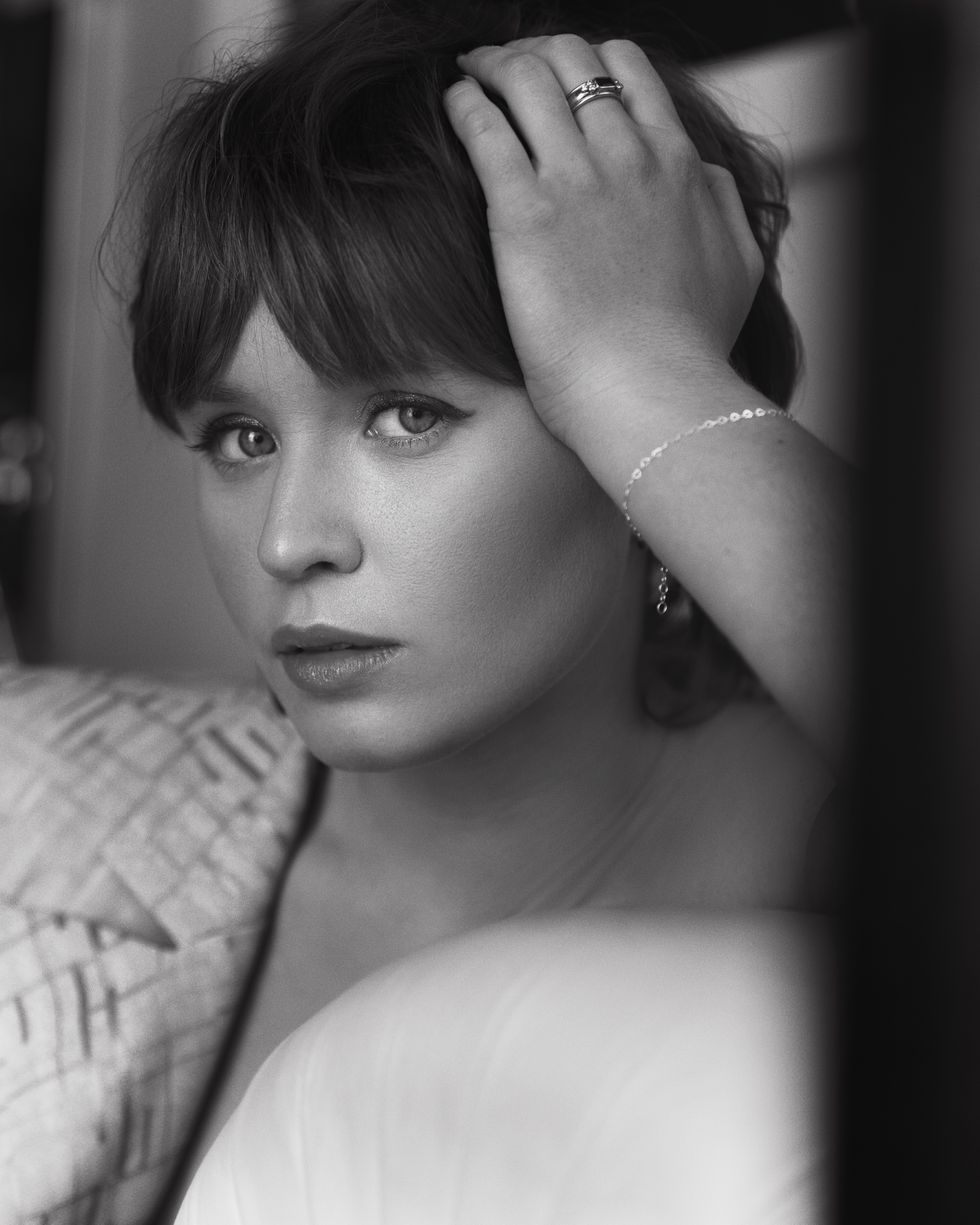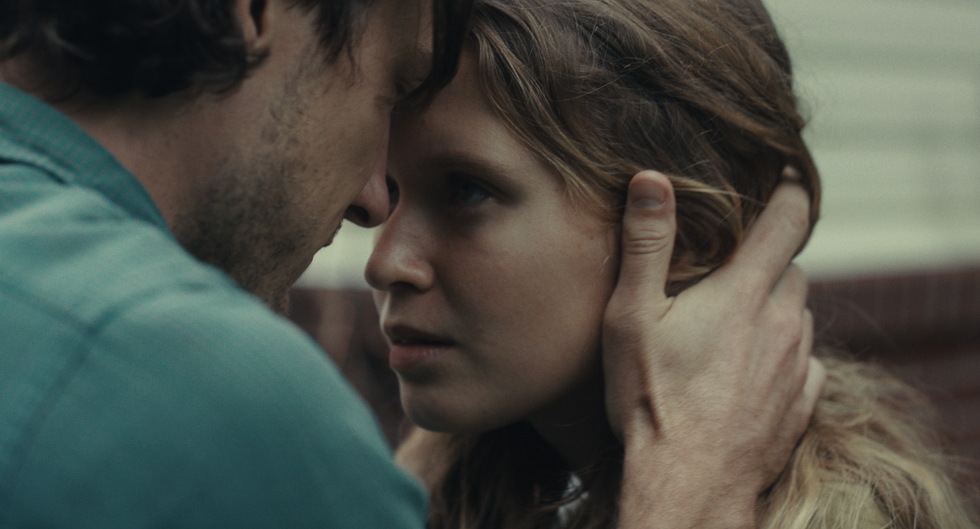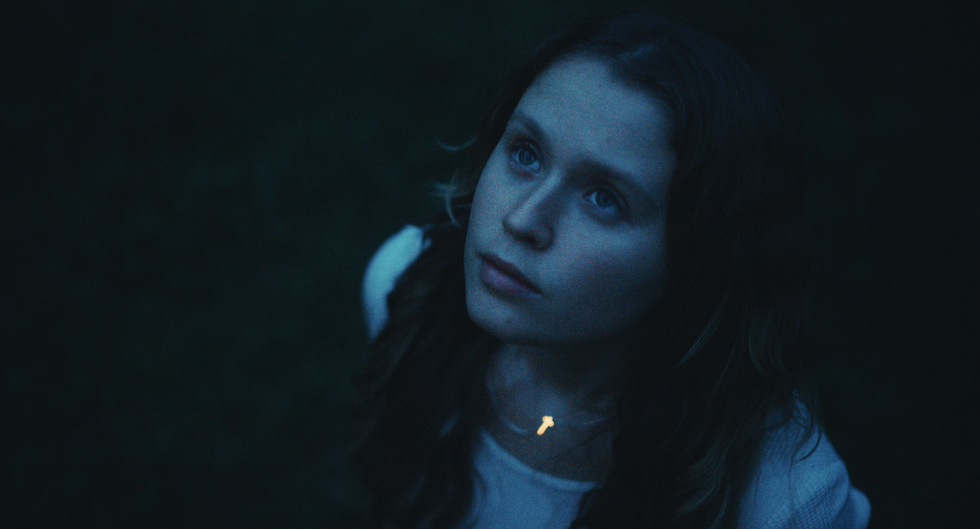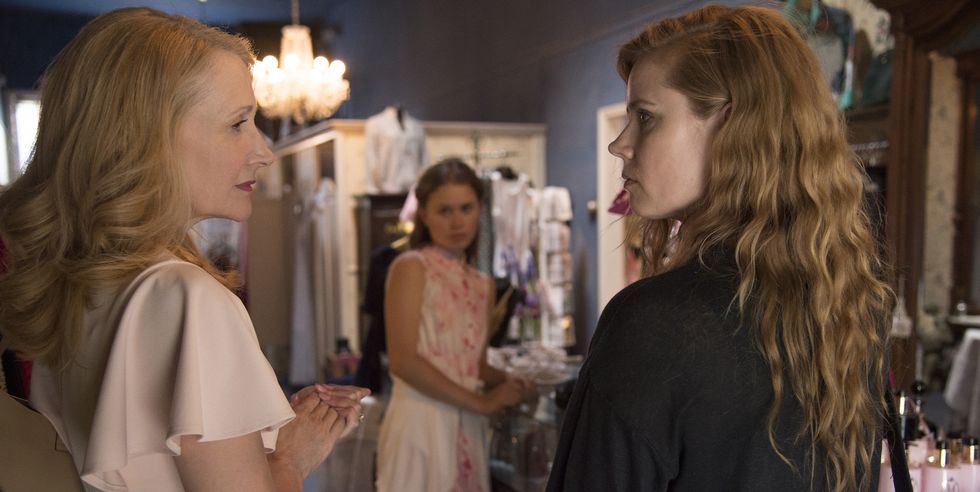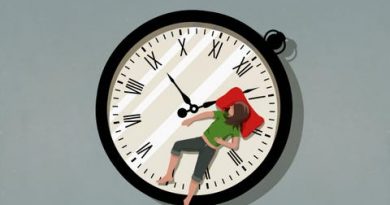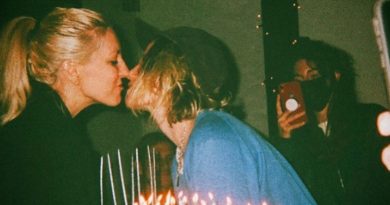Eliza Scanlen Explores Faith, Power, and Desire in The Starling Girl
Minor spoilers below.
Since her breakout role in HBO’s Sharp Objects, Eliza Scanlen has been building a stunning and eclectic body of work. Parts in Greta Gerwig’s Little Women and M. Night Shyamalan’s Old followed, as did the role of a young Eleanor Roosevelt in The First Lady.
Now, Scanlen is taking the lead in The Starling Girl, a dreamy coming-of-age drama with a dark undercurrent. She plays plays Jem, a teenager growing up in a fundamentalist Christian community, whose own desires—and passion for dance—challenge her experience of God. When twenty-something, married youth pastor Owen (Lewis Pullman) returns to the church, Jem is confronted with a burgeoning sexuality that completely contradicts the strict religious rules she’s been taught to follow. “She really does go down a very destructive path, and you as an audience hope that she’s going to stop and think for a minute before she makes a mistake,” Scanlen tells ELLE.com. “But she’s too young to do that.”
More From ELLE

The Starling Girl also exposes the patriarchal structures inherent in some Christian churches, as well as the sexist punishments that can be bestowed upon young women in fundamentalist communities. While Jem finds strength in her father’s connection to the outside world, she realizes her mother is tightly bound by her own shame, which she shares with her daughters. “Every character is so important in [The Starling Girl], because the film does explore how trauma and anxiety is passed on from generation to generation in these communities.”
Following its electric debut at Sundance, The Starling Girl hits theaters nationwide on May 19. Scanlen sat down with ELLE.com to talk about her role in the film, collaborating with director Laurel Parmet on her first feature, and her experiences making Sharp Objects and Little Women.
What drew you to The Starling Girl?
Firstly, I had worked with producer Kara Durrett, and when we were shooting our first film together, she had mentioned [The Starling Girl] to me, and I read it and loved it. Apart from that, I was drawn to the film because it surprised me in the way it portrayed Christian fundamentalists or fundamentalist religions. Jem was such a clear deviation from common portrayals of young women in those communities.
Also, this film’s about an inappropriate relationship between an older man and a younger woman. The common portrayals of that relationship either fall in the aggressive victim of abuse category or the complete erotic portrayal of that, like Lolita, for example. I can’t really think of any portrayals that don’t fall into those categories. So I felt like it was very unique in that way and exciting for an actor to play, because Jem is not debilitated by the restriction that she feels from her community. She’s a bit of a contrarian. She has a fiery spirit and she struggles to suppress that. And in the end, it does lead her into a destructive place, so I found that interesting. It was a very full, complicated character that I could explore, and it was a huge challenge that I was excited to take on.
I really connected with The Starling Girl because I grew up in the church and witnessed relationships like Jem and Owen’s. What was your take was on their relationship?
I think that Jem and Owen’s relationship starts with something quite innocent and it devolves into an abuse of power. It doesn’t come from a place of malice, but rather the environment that they’ve both been raised in, which is an inherently patriarchal system that requires women to uphold the dignity of men. If men get into these relationships with women, it’s because the women led them into temptation. But Jem and Owen’s relationship is so much more complicated than that, because they’re both misfits. They’re both outsiders who are drawn to each other because they represent possibility to one another and a freedom of expression that they have never felt before with other people in their community.
Owen teaches Jem a different conception of God, which alters her life in a very drastic way. Before developing a relationship with Owen, she was so caught up in this worry that her love for dancing was getting in the way of her relationship with God. Owen sets her free in a big way, and that makes Jem very vulnerable to him. And Owen also feels seen by Jem and has never felt seen in this way before and begins to think that they are destined to be with each other. I think there are times where he’s more aware of it than others, when he manipulates Jem into believing it’s her fault. It’s a very fraught relationship in which Jem feels a sense of agency, but at the same time is being manipulated, which I found really fascinating.
While there is an abuse of power, Jem is also having a personal awakening, and she goes on a positive journey. How did you approach the delicate subject matter while creating that sense of empowerment for your character?
It was difficult … I realized as I thought more about the character, that she has to go on this destructive journey to get to this place of freedom, and she has to go through it to get out of it. There’s no getting around it. I think Owen fast-tracks that experience for her. I think that Jem would’ve always had a reckoning and perhaps developed a different understanding of God.
Jem is unaware of Owen’s manipulation. She’s not conscious of it at all. So she dives head first into these encounters without understanding the catastrophic consequences of them. She’s confident, she’s expressive, she’s a contrarian, while at the same time being very vulnerable to Owen. I think it was my job as an actor to maintain that aliveness. She starts out as someone who is having this internal struggle with God and her own desires, and it snowballs quite quickly. I think she’s led by her desire more than she is led by God, and it snowballs until she gets to a point of no return and she has to make a decision about how she wants to express her relationship with God.
I never wanted to lose that fire in her. I never wanted to portray her as a victim. She was always expressive using her body, and even when she has sex for the first time with Owen, she’s in her body enough to know somewhat what to do. Whereas I think a lot of women her age in those communities would struggle with that. It’s so funny how she’s ridiculed at one minute by her friends, but she’s very strong. She doesn’t let that deter her, whereas most people in these communities wouldn’t push back against that. She does. Not consciously, I think.
What sort of preparation did you do to bring a story set in a fundamentalist community to life?
We were lucky to have two consultants on the film who we spoke to beforehand. We had very long conversations about what it was like to grow up in a fundamentalist community. That was quite influential for me, understanding what aspirations you had as a young girl that age in those communities. The general goal was to get married and have children, and I don’t think Jem ever wanted that. That troubled her. I think Jem knew that she wanted different things and she couldn’t understand why, because she was doing everything right but not feeling the same way. She couldn’t quite convince herself.
I think that it would be so troubling for someone in that community to feel that deep sense of shame we spoke about a lot. The consultants had both left their church and they spoke about how difficult that experience was. I’m sure often people relapse and go back to the church. In some circumstances, once you’re excommunicated from the church, you’re not welcome anymore, so it’s quite a traumatic experience for many people. I just found the world very fascinating. I think it was important for us to humanize these communities and view them from less of a moral lens and more from a human lens. Because you can make criticisms about fundamentalist communities, but we wanted to explore something beyond that.
The Starling Girl is Laurel Parmet’s directorial debut. How closely did you work together on the movie?
We worked very closely, so I feel very lucky to know Laurel. She is multi-talented. She is an incredible script writer, and the script was so incisive and specific and that is so hard to do; it stood out to me straight away. Laurel is very conscientious and had a very clear vision. She knew the script back to front, and I think that’s such a great advantage, having the writer also direct the film. She is very good at both. Also, Laurel is just in general a very good person, so we had a lovely time making [The Starling Girl]. And she’s such an approachable person in life that we became quite close and shared stories. To this day, we hang out and have amazing conversations.
You’re also a writer and director. What are you working on right now?
I wrote and directed a short film last year called How Can I Help You with Causeway Films, which is an Australian production company. My good friend Thomasin McKenzie starred in it. It’s a dark comedy that was selected for Sydney Film Festival this year, so that’s exciting. It’ll be screening in a couple of months. I’m enjoying the process of writing and directing and finding my voice and just chipping away at it. I get so much inspiration out of people like Laurel [Parmet], as you can imagine. It’s equivalent to a film degree watching these people work on set. So I’m very lucky.
I adored your performance in Sharp Objects. What was it like working opposite Amy Adams and Patricia Clarkson, and being such a pivotal part of that story?
Oh my gosh. I look back on that experience in awe, just remembering how young I was and that being the third job I ever did, apart from [Australian soap] Home and Away and a short film. I look back on that experience knowing now just how lucky I was to be introduced into the industry at that time where we were placing more of a focus on female-led dramas.
Jean-Marc Vallée was a visionary director. Amy really took me under her wing and she taught me a lot about acting and just generally how to navigate a set, because it can be a jarring place, it can be a nerve-wracking place, and she made that a lot easier for me. And Patricia, she’s such a maternal, loving person. I think I was in great company and learnt to take risks quite early on because of the people I was surrounded by. So I’m very, very grateful for that.
You were also in Greta Gerwig’s Little Women with such an amazing ensemble cast. Do you have any favorite memories from the set?
Saoirse [Ronan] and I knitted like mad women on that set. We would knit all the time. We made beanies and scarves and tea cozies. It was just such great company to be around. At one point, Florence [Pugh] and I went on a trip to New York together and had a little romantic getaway. It was really fun. And we all joke, we all lived in the same apartment complex, which was, I think like a retirement home as well. So we were the life of the party at that tired old town. It was really fun. I love those girls.
This interview has been edited and condensed for clarity.
Photography by Elias Tahan; Makeup by Mai Quynh; Hair by Cameron Rains.
Amy Mackelden is a freelance writer, editor, and disability activist. Her bylines include Harper’s BAZAAR, Nicki Swift, Cosmopolitan, Marie Claire, ELLE, The Independent, Bustle, Healthline, and HelloGiggles. She co-edited The Emma Press Anthology of Illness, and previously spent all of her money on Kylie Cosmetics.


